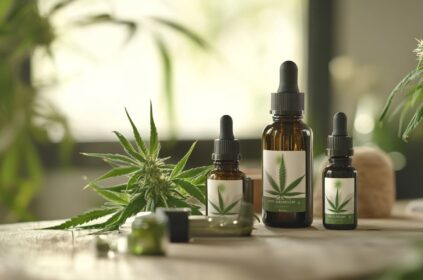Introduction
The world of delta-8 THC is rapidly evolving, capturing the attention of consumers and manufacturers alike. This psychoactive compound, derived from hemp, has found its way into the market, bringing both excitement and uncertainty. For manufacturers navigating this burgeoning sector, understanding the regulatory framework is essential. This guide delves into the regulatory challenges facing delta-8 THC manufacturers, covering key issues such as FDA compliance, testing, labeling, and quality control. By addressing these challenges early, producers can foster a safer, more compliant industry.
FDA Compliance and Oversight
Current Regulatory Status
At the core of delta-8 THC’s regulatory landscape is the FDA, which has been clear in its position, delta-8 THC is not approved for use in conventional food or drug products. Under the Federal Food, Drug, and Cosmetic Act (FD&C Act), the FDA considers delta-8 THC products to be both misbranded and adulterated.
- Misbranded Products: Companies selling delta-8 THC have received warning letters from the FDA primarily because their labeling lacks adequate usage directions. Such oversights mean that the products can be offered for conditions that are unsuitable for self-treatment by consumers.
- Adulterated Foods: The FDA has classified delta-8 THC as not meeting the Generally Recognized as Safe (GRAS) criteria. This has significant implications, rendering any food product containing delta-8 THC adulterated according to federal law.
Future Regulatory Developments
The regulatory climate for delta-8 THC remains fluid. The anticipated 2023 Farm Bill could reshape the regulatory framework and potentially redefine “hemp” in a manner that affects delta-8 THC products. Manufacturer vigilance is key as they adapt to ongoing changes in state and federal regulations.
Testing and Quality Control
Importance of Testing
Quality and safety are top concerns for delta-8 THC manufacturers, particularly in light of the FDA’s expressed concerns regarding impurities and production methods. Thorough testing protocols are essential.
- Batch Testing: Regular batch testing should be a standard practice among manufacturers to confirm the consistency and purity of products. This testing should include assessments for THC levels and contaminants.
- Third-Party Labs: Engaging third-party laboratories for testing not only ensures compliance but enhances consumer confidence in product safety. These labs can independently validate product composition and safety credentials.
Quality Control Measures
Robust quality control practices are vital to uphold both compliance and consumer trust.
- Manufacturing Processes: Implementing standardized and controlled manufacturing processes can diminish risks associated with impurities and inconsistency.
- Supply Chain Transparency: Manufacturers should focus on clear supply chain practices, ensuring raw materials and final products can be traced back through each stage—this is crucial not just for compliance, but also for maintaining customer trust.
Labeling Requirements
Essential Labeling Components
Proper labeling serves as a critical foundation for compliance and consumer safety. The following components are crucial for delta-8 THC product labels:
- Product Identification: Clearly state that the product contains delta-8 THC.
- Quantitative Disclosure: Display net weight or volume prominently.
- Ingredients List: Provide a comprehensive list of all ingredients, including delta-8 THC.
- Usage Guidance: Offer thorough instructions on product use.
- Warnings and Disclaimers: Include necessary precautions regarding psychoactive effects and potential risks involved with use.
Custom Labeling Features
Enhancing labels beyond basic requirements can further promote compliance and safety:
- Sequential Numbering: Aids in tracking products throughout the supply chain.
- QR Codes and Barcodes: Facilitate the provision of additional information and enhance product authenticity.
State-Specific Regulations
Legal Status Variability
The legality of delta-8 THC varies widely from state to state. As it stands, delta-8 THC is legal in 22 states and one district, with limited regulations. Conversely, it is banned in 17 states and heavily restricted in an additional 7 states.
- State Approval: Manufacturers must fully understand and secure appropriate state approvals for the products they plan to distribute, ensuring that they comply with each state’s legal landscape.
Compliance Strategies
Navigating varying state regulations requires vigilance and adaptability. Here are some strategies:
- Stay Informed: Continuously monitor changes to state laws regarding delta-8 THC regulation.
- Local Adaptation: Guarantee that products align with the specific regulations of the states in which they are sold.
- Legal Consultation: Regular consultations with legal experts can help ensure compliance with an ever-evolving regulatory environment.
Conclusion
The regulatory landscape for delta-8 THC manufacturers is undoubtedly challenging, marked by a mix of federal oversight and state-specific laws. Manufacturers must prioritize FDA compliance, implement rigorous testing and quality control protocols, ensure proper labeling, and adhere to state regulations to maintain their market presence and consumer trust.
Actionable Tips
- Stay Updated: Regularly educate yourself on the latest regulatory changes and implications for delta-8 THC.
- Invest in Compliance: Ensure thorough batch testing and consider partnering with accredited third-party labs for product validation.
- Focus on Labeling: Make certain that your labels contain all essential information to meet compliance requirements.
- State-Specific Strategies: Maintain current knowledge of state laws and ensure all licensing and approvals are in place to avoid legal pitfalls.
By following these best practices, delta-8 THC manufacturers can pave a path towards a more compliant, trustworthy future in the industry, benefiting both their businesses and the consumers who rely on their products.




















